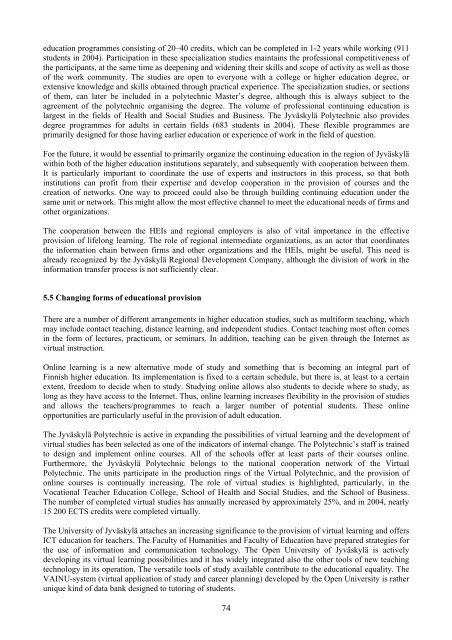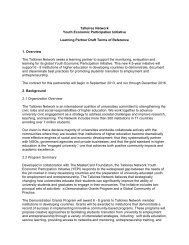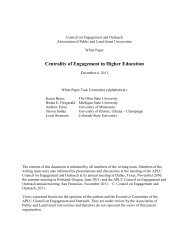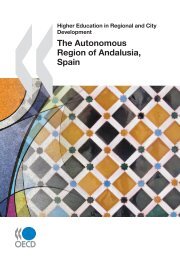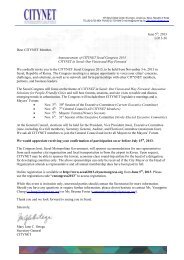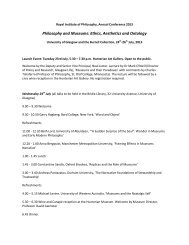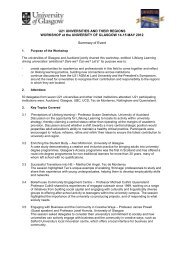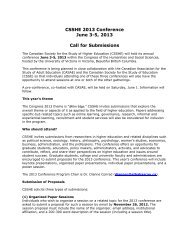In 2004 over 18 000 Finnish people, young and adults alike, chose to study in the Open University ofJyväskylä. The majority of students came from the Jyväskylä region and other parts of Central <strong>Finland</strong>(partly due to the active marketing in the region). The University of Jyväskylä and Helsinki led the field inthe provision of Open University teaching in <strong>Finland</strong>, as measured by total annual study places. The openuniversity teaching provided by the University of Jyväskylä covers nearly one fourth of the total volume in<strong>Finland</strong>. The Open University of Jyväskylä promotes educational equality by providing university levelstudies for all interested individuals, without age limits or requirements for basic education. The teachingcorresponds with the basic university level in terms of quality. Information technology is widely utilized andprofited from in the organizations of the studies, and cooperation with the virtual university is intensive. TheOpen University channel provides the option of becoming a university degree student on the basis of OpenUniversity studies.The Open University concentrates only on teaching activities and they are not allowed to carry out externalregional projects, even if customized projects for municipalities and different organizations are sometimesdemanded. From the regional perspective, the role of the Open University is to provide education for peoplewho want to update their skills or learn something new. The studies are easily accessible for people inworking life as well as for the unemployed and for those searching for their ”own” field of study. The OpenUniversity is also an important provider of competence education as, e.g., in 2004 nearly 2 000 OpenUniversity’s students worked as teachers and wanted to have competence in another subject through openuniversity path. Hence, the Open University of Jyväskylä helps to maintain the knowledge base of theregional labour force. It has an active role in career planning of personnel in surrounding municipalities andother organizations and through allocation of marketing activities this could be further strengthened.The Continuing Education Centre operates as a business organization within the University of Jyväskylä,providing customized education and management programmes to clients. They unit sees its role as that of anintermediate organization between the university and external actors that transfer the academic knowledgeinto practise. The direct regional focus has not been very strong in recent years, but its importance isincreasing. The existing diverse networks can be seen to facilitate regional engagement.However, continuing education is not very effectively coordinated at the University of Jyväskylä. In additionto the teaching organized in the Continuing Education Centre, the faculties provide their own continuingeducation. As such, there is a clear need to develop the system so that the University’s disparate continuingeducation services would be gathered together into a one large operative unit.Box 5.2 University of the Third Age provides education for elderly peopleThe University of the Third Age (UTA) programmes are running in nine institutes of higher education(Jyväskylä, Helsinki, Tampere, Kuopio, Joensuu, Turku, Rovaniemi and Vaasa) in <strong>Finland</strong>. Third ageuniversity services are coordinated and developed by a national advisory board, which was established in1989. One of the typical reasons for participating in the programmes is, for instance, that these elderlypeople did not have a chance to study earlier in their lives, due to lack of financial resources, war, orsome other external constraint.The University of the Third Age of Jyväskylä, the first in <strong>Finland</strong>, started in 1985. It arrangesprogrammes in eight towns. The main tasks of UTA-activities are: (1) to promote elderly peoplesphysical, psychical and social health; (2) to promote educational and cultural equality betweengenerations; (3) to improve dialogue between generations; and (4) to co-operate with academicgerontology research and the staff of the Centre for Social Welfare and Health Services (of older people)in Jyväskylä. The main programmes are: lecture series, seminars, publishing, students' programmes,study tours, projects, research, and international networking. The UTA programmes have been extremelypopular in Jyväskylä from the very beginning. The total number of participants is about 2 500 olderpeople, of which 75 - 80% are women. The average age of the participants is 65 years, with their basiceducation varying from primary level to tertiary.In addition, the Jyväskylä Polytechnic provides continuing education, although to a lesser extent whencompared to the University of Jyväskylä. The professional specialization studies it offers are continuing73
education programmes consisting of 20–40 credits, which can be completed in 1-2 years while working (911students in 2004). Participation in these specialization studies maintains the professional competitiveness ofthe participants, at the same time as deepening and widening their skills and scope of activity as well as thoseof the work community. The studies are open to everyone with a college or higher education degree, orextensive knowledge and skills obtained through practical experience. The specialization studies, or sectionsof them, can later be included in a polytechnic Master’s degree, although this is always subject to theagreement of the polytechnic organising the degree. The volume of professional continuing education islargest in the fields of Health and Social Studies and Business. The Jyväskylä Polytechnic also providesdegree programmes for adults in certain fields (683 students in 2004). These flexible programmes areprimarily designed for those having earlier education or experience of work in the field of question.For the future, it would be essential to primarily organize the continuing education in the region of Jyväskyläwithin both of the higher education institutions separately, and subsequently with cooperation between them.It is particularly important to coordinate the use of experts and instructors in this process, so that bothinstitutions can profit from their expertise and develop cooperation in the provision of courses and thecreation of networks. One way to proceed could also be through building continuing education under thesame unit or network. This might allow the most effective channel to meet the educational needs of firms andother organizations.The cooperation between the HEIs and regional employers is also of vital importance in the effectiveprovision of lifelong learning. The role of regional intermediate organizations, as an actor that coordinatesthe information chain between firms and other organizations and the HEIs, might be useful. This need isalready recognized by the Jyväskylä <strong>Region</strong>al Development Company, although the division of work in theinformation transfer process is not sufficiently clear.5.5 Changing forms of educational provisionThere are a number of different arrangements in higher education studies, such as multiform teaching, whichmay include contact teaching, distance learning, and independent studies. Contact teaching most often comesin the form of lectures, practicum, or seminars. In addition, teaching can be given through the Internet asvirtual instruction.Online learning is a new alternative mode of study and something that is becoming an integral part ofFinnish higher education. Its implementation is fixed to a certain schedule, but there is, at least to a certainextent, freedom to decide when to study. Studying online allows also students to decide where to study, aslong as they have access to the Internet. Thus, online learning increases flexibility in the provision of studiesand allows the teachers/programmes to reach a larger number of potential students. These onlineopportunities are particularly useful in the provision of adult education.The Jyväskylä Polytechnic is active in expanding the possibilities of virtual learning and the development ofvirtual studies has been selected as one of the indicators of internal change. The Polytechnic’s staff is trainedto design and implement online courses. All of the schools offer at least parts of their courses online.Furthermore, the Jyväskylä Polytechnic belongs to the national cooperation network of the VirtualPolytechnic. The units participate in the production rings of the Virtual Polytechnic, and the provision ofonline courses is continually increasing. The role of virtual studies is highlighted, particularly, in theVocational Teacher Education College, School of Health and Social Studies, and the School of Business.The number of completed virtual studies has annually increased by approximately 25%, and in 2004, nearly15 200 ECTS credits were completed virtually.The University of Jyväskylä attaches an increasing significance to the provision of virtual learning and offersICT education for teachers. The Faculty of Humanities and Faculty of Education have prepared strategies forthe use of information and communication technology. The Open University of Jyväskylä is activelydeveloping its virtual learning possibilities and it has widely integrated also the other tools of new teachingtechnology in its operation. The versatile tools of study available contribute to the educational equality. TheVAINU-system (virtual application of study and career planning) developed by the Open University is ratherunique kind of data bank designed to tutoring of students.74
- Page 1 and 2:
OECD/IMHE ‐ Supporting thecontrib
- Page 3 and 4:
SUMMARYTogether with 13 other regio
- Page 5 and 6:
8.2 Increasing the regional effecti
- Page 7 and 8:
I INTRODUCTION1.1 Strengthening the
- Page 9 and 10:
development. The aim is that region
- Page 11 and 12:
The self-evaluation considered here
- Page 13 and 14:
densely populated cities in Finland
- Page 15 and 16:
1,9 %1,7 %1,5 %1,3 %Population chan
- Page 17 and 18:
The share of jobs in primary produc
- Page 19 and 20:
New pillars of future’s developme
- Page 21 and 22:
Jyväskylä0,60,91,11,0Central Finl
- Page 23 and 24: 2.4 Governance StructureMunicipalit
- Page 25 and 26: of its development outside the cent
- Page 27 and 28: III CHARACTERISTICS OF THE HIGHER E
- Page 29 and 30: continuing education and open unive
- Page 31 and 32: The Science and Technology Policy C
- Page 33 and 34: 3.2 Regional dimension within the n
- Page 35 and 36: order to respond to the challenges
- Page 37 and 38: 14001200Master's degreesDoctoratesN
- Page 39 and 40: 900800Youth graduatedAdult graduate
- Page 41 and 42: provide information for the basis o
- Page 43 and 44: CabinetParliamentSTPCSteering (andf
- Page 45 and 46: 5,04,0Billion euros3,02,01,00,083 8
- Page 47 and 48: The number of refereed articles is
- Page 49 and 50: Centre of expertisePaper industryBi
- Page 51 and 52: The Institute for Environmental Res
- Page 53 and 54: and systematic gradually progressin
- Page 55 and 56: are seen to be very important chann
- Page 57 and 58: Internal support units of HEIsThe F
- Page 59 and 60: of interviewed HEI staffs, the coop
- Page 61 and 62: areas of the region’s Centre of E
- Page 63 and 64: system of Jyväskylä and the HEIs
- Page 65 and 66: V CONTRIBUTION OF TEACHING AND LEAR
- Page 67 and 68: esources to establish new activitie
- Page 69 and 70: The main problem for the Finnish la
- Page 71 and 72: longer. 2.5% of the Jyväskylä Pol
- Page 73: activities. As a part of the new qu
- Page 77 and 78: the TE-Centre of Central Finland an
- Page 79 and 80: practices in the provision of educa
- Page 81 and 82: Reason forskillupgradingDescription
- Page 83 and 84: Strengths+ HEIs are actively confro
- Page 85 and 86: taxation, to lower the unemployment
- Page 87 and 88: Box 6.2 The WIRE -projects: Support
- Page 89 and 90: indoor ice-skating rink, the Rauhal
- Page 91 and 92: The School of Cultural Studies at t
- Page 93 and 94: the number of registered customers
- Page 95 and 96: Box 6.9 Environmental management in
- Page 97 and 98: Strengths+ The significance of HEIs
- Page 99 and 100: eferring to the regional developmen
- Page 101 and 102: Key topics relating to changes in t
- Page 103 and 104: participation in the decision makin
- Page 105 and 106: in the strategy-making process. The
- Page 107 and 108: 7.5 Critical points in promoting th
- Page 109 and 110: 7.Cooperation in strategies concern
- Page 111 and 112: egion is according to national and
- Page 113 and 114: oundaries for further developmental
- Page 115 and 116: joining resources and operations by
- Page 117 and 118: Discussion proposal 15: To ensure d
- Page 119 and 120: achieved by the horizontal utilizat
- Page 121 and 122: Appendix 2 Information on data used
- Page 123 and 124: and finding synergy between the oth
- Page 125 and 126:
School of BusinessRoleThe School of
- Page 127 and 128:
The challenge of the school from re
- Page 129 and 130:
developing wellness and environment
- Page 131 and 132:
Faculty of EducationRoleThe Faculty
- Page 133 and 134:
and/or graduation thesis is a signi
- Page 135 and 136:
Areas of strength and prioritising
- Page 137 and 138:
Agora Center’s partners from the
- Page 139 and 140:
Currently the priority of ITRI’s
- Page 141 and 142:
Weak spots and areas to develop in
- Page 143 and 144:
Employment and Economic Development
- Page 145 and 146:
Appendix 3 Analysis of the most sig
- Page 147 and 148:
Appendix 4 Regional effects (input-
- Page 149 and 150:
The overall value of production cre
- Page 151 and 152:
Appendix 5 Reform of regional struc
- Page 153 and 154:
Appendix 7 Provision of education i
- Page 155 and 156:
Appendix 8 Statistical information
- Page 157 and 158:
Appendix 10 Statistics on financing
- Page 159 and 160:
Appendix 12 Labour market activity
- Page 161 and 162:
Appendix 14 Master’s Programmes a
- Page 163 and 164:
Uusiutuvan energian tutkimusohjelma
- Page 165 and 166:
BIBLIOGRAPHYAcademy of Finland (200


